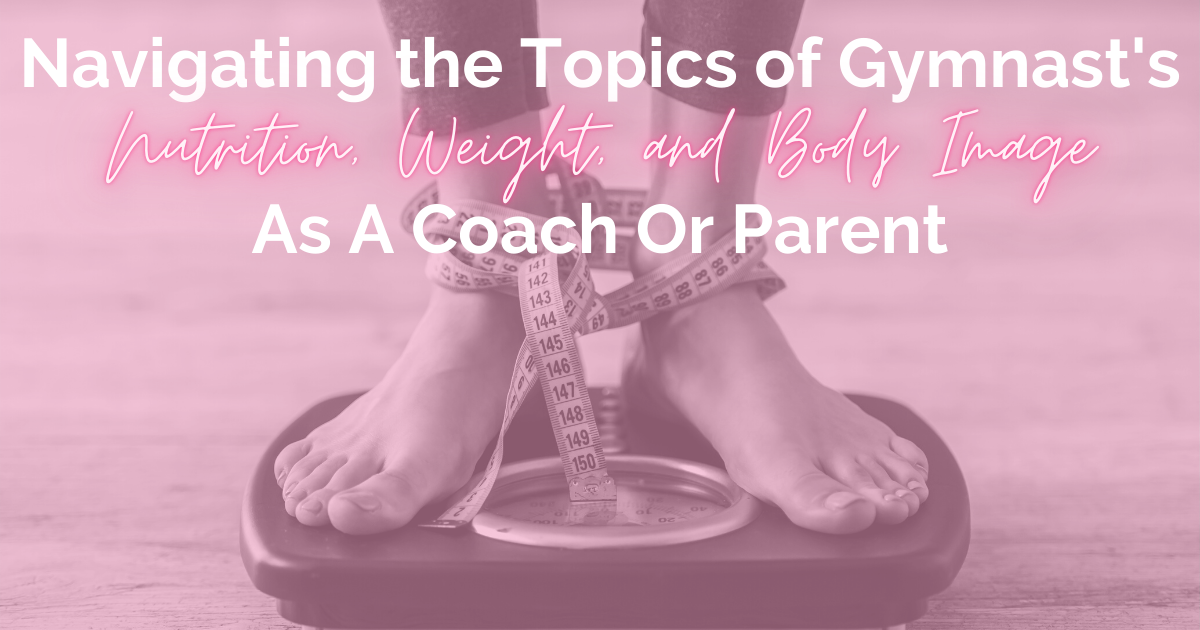
Navigating the Topics of Gymnast Nutrition, Weight, and Body Image as a Coach or Parent
explore the blog
free training
The Podcast
Learn to fuel the gymnast for optimal performance and longevity in the sport.
How to Fuel the Gymnast
Learn how to fuel your gymnast so that you can avoid the top 3 major nutrition mistakes that keep most gymnasts stuck, struggling, and injured.
looking for...?
How do you approach the hard conversations about weight and nutrition with the gymnast as a parent or coach? How do you ensure that what you say isn’t going to spark an eating disorder or other harmful behaviors. How do you know if something is amiss or if the gymnast is just experiencing normal growth and development?
To answer your questions, I invite you to watch this webinar.
After Dave Tilley’s Shift Movement Science epic nutrition podcast episode released last week (that I was blessed to be part of!) we’re going to continue the conversation about nutrition and body weight with gymnasts.
I had the privilege of providing a webinar for USA Gymnastics per the request of their new VP of Athlete Wellness Dr. Kim Kranz. She specifically asked me to speak on the topics of body weight, nutrition advice, etc and I am confident we share the same values and beliefs about what’s appropriate and what’s not for our sport.
Two of the most glaring nutrition-related issues in our sport of gymnastics:
-Inappropriate nutritional advice from coaches, parents, unqualified practitioners
-Inappropriate body comments and body/weight standards that aren’t based on objective data
Part of my platform is to speak out against the inappropriate guidance and advice that has been given to our athletes and coaches for much too long. It’s time to practice with evidence-based medicine. Gymnasts are not unique. We are not exempt from what the research shows are best practices for nourishing the athletes and helping them perform optimally while promoting true health.
Only because of Jesus have I recovered from the eating disorder and am able to speak so freely about these really hard topics as a professional. I am in the trenches everyday working with high level athletes who are struggling with food and their bodies. Coaches and parents are not fully responsible for the gymnast’s struggles, but they play the two most important roles in their lives and thus are often implicated.
When I was struggling with the eating disorder and even into the first few years of recovery, I knew that one day my story would be used. One day, the struggles and strife would be used for His glory and that time has come.
My story is representative of hundreds and thousands of gymnastics that have come before me and have sadly come after me. The statistics show that 50-60% of gymnasts are struggling with symptoms of disordered eating or clinical eating disorders. We must change.
At the end of the day, gymnasts are still little girls and young women who will one day leave the sport. Whether they leave at their choosing or are forced out due to injuries, eating disorders, or other struggles, we have a duty to care for them with “life beyond sport” in mind.
As always, if you’re a gymnast, coach, or parent with questions or concerns, please reach out. I’m happy to serve as a resource for this community and am in your corner.
PLEASE listen and share this with every single person in your gymnastics community. It would mean the world to me as this is such an important topic that we have failed to adequately address. This is just the beginning.
on the blog